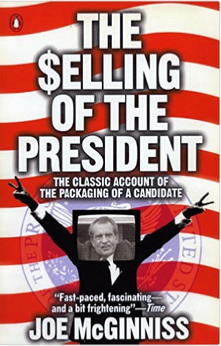Seminal Works of Political Campaign Narrative: Part 2
Adapted from my 2015 Masters Degree Creative Project “Tie-dyed Candidate”
I’ve begun studying the evolution of the long-form narrative style of reporting on political campaigns. My creative project in 2015 for my MA in journalism utilized long-form narrative style in a character study of the Libertarian candidate for Governor of Indiana. Many works of long-form political coverage served as inspiration, or led to other works that I’m studying now (or are on my list for study).
This piece looks at another ground-breaking piece of journalistic long-form narrative. McGinniss’ work looking at the men who were packaging and preparing the message of the campaign, working to overcome the deficiencies that White noted about Nixon’s 1960 campaign, took readers behind the scenes of the campaign machinery that was reacting to the new ways of marketing via television.
Joe McGinnis – in the introduction to the 1988 reprint of his ground-breaking bestseller on the 1968 presidential campaign,The Selling of the President: The Classical Account of the Packaging of a Candidate – pays homage to White (McGinniss 1988, xiv–xv). McGinnis was just four years out of college when he chronicled Nixon’s second presidential campaign. During a casual conversation with an advertising agency.
vice president, McGinniss learned that likely Democratic Party nominee Hubert Humphrey had hired the ad agency to create a winning image for his campaign. Shortly after that meeting McGinnis happened to be meeting with a publisher to discuss ideas for a potential books. They realized together that “there might well be room for a more specialized, tightly focused treatment of what seemed a striking new phenomenon – the marketing of political candidates as if they were consumer products,” (McGinniss 1988, xiv-xv).
McGinnis echoes one of Kramer’s rules for literary journalists: “[They] work out implicit covenants about accuracy and candor with readers and with sources,” (Kramer 1995, 23). McGinniss clearly was not objective in the book, and much of his personal opinion is reflected in his writing. By declaring early on in his book that “politics and advertising have always been ‘con games’” he demonstrates Kramer’s rule on covenants and candor (Kramer 1995, 23). He asserts that television, “with its emphasis on style and disinterest in substance is particularly useful to politicians without ideas,” (Steiner 1992, 367–8).
McGinniss follows other tenets of literary journalism, including “spending immense amounts of time with the major characters, participating in both the intimate and dramatic moments of their lives,” (Steiner 1992, 371). However, he seems not “to develop or sustain affection for the people and cultures he describes. His intense negativism, if not hostility, brings him closer to the bleak worldview of some modern novelists and separates him from the more tolerant or even enthusiastic sensibility of literary journalists,” (Steiner 1992, 367).
McGinniss reinforces the awkward image of Nixon that White captured in the 1960 campaign. “Selling shows how the image of Richard Nixon – initially grumpy, aloof, and fearful of television – was transformed and promoted through television to audiences,” (Steiner 1992, 368). Unlike White, McGinniss doesn’t grow attached to the characters he is chronicling. He often seems to find character flaws that he brings out in his writing. “[H]is people do themselves in, announce their own poignancy, crassness, lostness, and now and then, nobility,” and “Despite his studious avoidance of overstatement, some critics saw Selling as a hatchet job by a young know-it-all” (Steiner 1992, 367).
Works Cited in this piece:
Kramer, Mark. 1995. “Breakable Rules for Literary Journalists.” In Literary Journalism, 467. New York: Ballantine Books.
McGinniss, Joe. 1988. The Selling of the President. New York: Penguin.
Steiner, Linda. 1992. “Joe McGinnis.” In A Sourcebook of American Literary Journalism. Westport: Greenwood Press.
Literary Journalism by Sims, Norman, Kramer, Mark (1995) Paperback
The Selling of the President: The Classical Account of the Packaging of a Candidate
